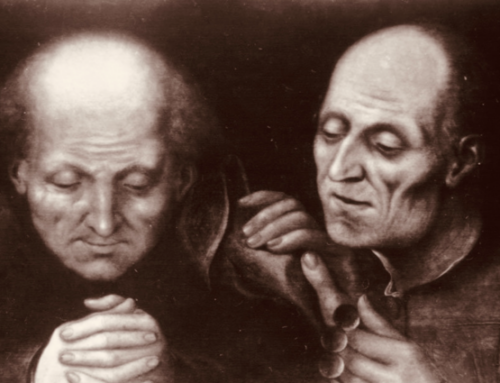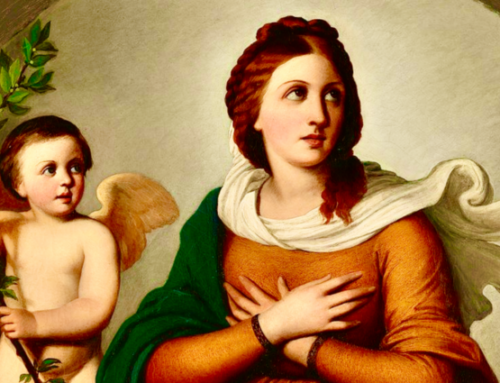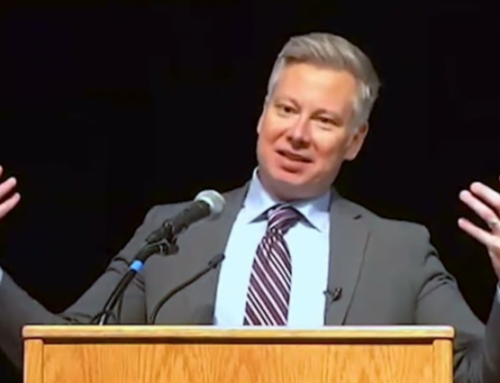As Christians, we may say that God is our Good Shepherd, our Rock and our Salvation, our Lawgiver and King, the Light of the World, and rejoice that we have these names—as opposed to definitions—that help us to understand Him.
 Analytic philosophy is limited in its scope regarding the knowledge of God. Richard Swinburne, a British contemporary philosopher influential for his arguments for the existence of God, admits the limitations of his field in his lecture, “What We Cannot Know about God.”[1] For example, we say that God is a Person, but we are unable to explain why He is so or really how an eternal, changeless Being perfect in goodness, power, and wisdom could be a person. What we understand by “person” is in relation to imperfect and frequently changing human beings. God, who is His own cause—a statement which Dr. Swinburne also points out as confusing—and who is the source of all that exists, cannot, it seems, to be reduced to the term of “person” and, in light of His perfect qualities, fits Plato’s idea of the Form. Yet to lack the personal qualities such as the ability to love, to communicate, to express emotion, to will, is to be reduced to a thing, or a mindless entity, which God cannot be.
Analytic philosophy is limited in its scope regarding the knowledge of God. Richard Swinburne, a British contemporary philosopher influential for his arguments for the existence of God, admits the limitations of his field in his lecture, “What We Cannot Know about God.”[1] For example, we say that God is a Person, but we are unable to explain why He is so or really how an eternal, changeless Being perfect in goodness, power, and wisdom could be a person. What we understand by “person” is in relation to imperfect and frequently changing human beings. God, who is His own cause—a statement which Dr. Swinburne also points out as confusing—and who is the source of all that exists, cannot, it seems, to be reduced to the term of “person” and, in light of His perfect qualities, fits Plato’s idea of the Form. Yet to lack the personal qualities such as the ability to love, to communicate, to express emotion, to will, is to be reduced to a thing, or a mindless entity, which God cannot be.
So, Dr. Swinburne suggests that we “stretch” our understanding of the terms “Person” and “Form” to compliment the ideas that we propose. In other words, we modify the meaning of certain words in order to encompass a broader idea which we cannot properly designate with a single word. This stretching of words makes plain the limitations of our language to communicate accurately our concepts, and even of our understanding of a Person outside of the finite realm. While analytic philosophy is immensely valuable—that is, if one realizes its limitations—and explains much, it is foolish to suppose that it can define and explain God perfectly and alone; the belief that we could contradicts its own concept of God’s infinity and our finiteness.
Realizing the narrowness of the Enlightenment philosophers of his time who relied too heavily on reason, Blaise Pascal formulates a reply: “The heart has its reasons of which reason knows nothing…. God is perceived by the heart, not by the reason.”[2] Pascal does not claim that the heart has a greater faculty of perceiving God than reason, or that reason is useless, but he asserts that the heart perceives God—though perhaps does not comprehend fully—because of its different approach and nature.
So, when analytic philosophy has run its course, it is time to change angles: If God is a Person, we, if allowed, could interact with Him, we could gather personal, experiential knowledge of Him. The heart, or the intuitive faculty of the soul, has a capability that reason, or the mental faculty, does not. The heart is the receptor of intuitive concepts or truth, as well as, and more importantly, divine revelation. In addition, it experiences and applies events associatively. One such angle, then, is poetry.
Poetry communicates primarily through images and association contrived by words or sounds. A well-written poem can often express the wrongness of abortion or the cruelty of slavery more powerfully and more persuasively than an articulate argument, because the reader experiences the idea on an emotional, associative level. For example, the injustice described in a poem may arouse a feeling of righteous anger because it sparks a personal memory of the reader and a corresponding emotion of pity, compassion, or anger. One’s personal experiences, separate from the poem, then become linked with the spirit of the poem by the shared emotion or some connecting phrase. The poem lives and breathes truth in a way that is beautiful, real, and compelling.
Of course, a poem is not necessarily more right or more precise than—and should not be pursued in place of—prose or intellectual arguments. Yet poetry has the unique ability to explicate truth through beauty, rhythm, and association, and to motivate a person to encounter and interact with truth in a manner that is unlike the approach of analytic philosophy. Poems—by association, narrative, and images—make concrete and vivify concepts in experience. Homer, Vergil, Dante, John Donne, Petrarch, and many other poets have exerted a major influence in Western civilization—in culture, politics, poetry, story-telling, philosophy—throughout the centuries because they presented truth with tremendous beauty and precision. Their works are both studied and enjoyed. The truth sticks more frequently when it has been processed by both the heart and the mind, and poetry engages both.
In divine revelation (as opposed to natural revelation), God often describes Himself and other heavenly truths in poetry or poetic language. Much of the major Old Testament prophets’ works recorded God’s words to the people in poetic verse. Rejoicing in the promised display of goodness God has shown him, Isaiah writes,
For he has clothed me with garments of salvation
and arrayed me in a robe of his righteousness,
as a bridegroom adorns his head like a priest,
and as a bride adorns herself with her jewels.[3]
In prose, the prophet could have explained how God saved his soul and transformed him, removing sin and seeing him with His own righteousness, but the poetic and metaphorical language he chooses radiates with the beauty of grace. The image of rich and beautiful garments, which we are not worthy to wear, and a holy God calling us His beloved, conjures up associations of beauty, love, favor, and restoration, and creates a sense of humility and joy, the kind we experience when we receive a gift we do not deserve. This emotional—and spiritual—response can be more potent and life-changing than simply a recitation of a philosophical definition of grace, because the heart is struck not only by the beauty of the image and language but also by the beauty of the truth. In other words, the heart perceives the truth and goodness of God’s character through experiencing the other transcendental beauty. Mere emotional responses are fleeting and shallow as vapor unless meditation on truth is also involved.
In addition to the prophets, the psalmists, King Solomon, and Christ Himself use poetic language to communicate with God, to share wisdom with others, and to describe God and His kingdom in a personal and deeply meditative tone. In the Gospels, God is called the Good Shepherd, invoking an image of a man caring and looking after his sheep—denoting a relationship between God and man with a metaphor that the people of the time could easily relate to. David and Solomon call the Lord a “strong tower,” a safe fortress for the righteous; they give Him a name rather than a definition. In this way, God, then, is not subjected to study and instead is pursued as a father, a friend, a master, a king. This relationship aspect, of course, is precisely what makes Christianity a religion different from any other: Christianity becomes not a religion of the intellectuals or of the political leaders or of the good, wise men, but of the humble spirit who perceives God not through his own holiness or logic or reason, but through his open heart by faith. The seed lands on this good soil.
We can see the beauty and truth in the poetry of Scripture, and we can really understand when we acquire the experiences that our relationship with Him, in prayer and reading of His Word, yields: We know He is a Person because God speaks to us, loves us, communes with us; and we know that He is a Form because of the justice we see Him command, the unsurpassed goodness and holiness He displays, the wisdom we do not understand, His eternity as He has endured changeless through thousands of generations, the perfection that reveals our imperfection.[4]
Images and association express truth—truth that may be difficult to explain by other means—in ways that everyone can understand because it does not always require intellectual aptitude. In poetry, definitions do not require the “stretching” of words that philosophy utilizes to comprehend and explain God. We are grateful to be able to say God is both a Person and a Form, perfect in goodness, power, and knowledge, and to be satisfied in figuring out how the puzzle pieces fit together philosophically. But as Christians, we may say He is our Good Shepherd, our Rock and our Salvation, our Lawgiver and King, the Light of the World, and rejoice that we have these names—as opposed to definitions—that help us to understand Him, and in turn help us to describe Him, as well as to conjure the proper attitude toward Him of love and humility. Pascal finally grasped this during the Night of Fire when he referred to “the God of Abraham, the God of Isaac, the God of Jacob, not of philosophers and scholars…. My God and your God.”[5]
The Imaginative Conservative applies the principle of appreciation to the discussion of culture and politics—we approach dialogue with magnanimity rather than with mere civility. Will you help us remain a refreshing oasis in the increasingly contentious arena of modern discourse? Please consider donating now.
Notes:
[1] Dr. Richard Swinburne presented this lecture at Houston Baptist University on March 2, 2018.
[2] Blaise Pascal. Pensées.
[3] Isaiah 61:10, NIV
[4] See Isaiah 40.
[5] Blaise Pascal. Pensées.
The featured image is courtesy of Pixabay.







What a wonderful essay, Ms. Kleinhenz. And the Book of Isaiah is so full of wonderful quotes where the beauty of God will lead man to righteousness. Here’s another quote: “Come now, let us reason together, says the Lord: though your sins are like scarlet, they shall be as white as snow, though they are red like crimson, they shall become like wool. If you are willing and obedient, you shall eat the good of the land” (Is 1:18-19).